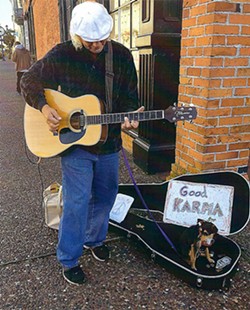Strumming Up a Case
Local troubadour lead plaintiff in Eureka panhandling challenge
By Linda Stansberry [email protected] @lcstansberry
[
{
"name": "Top Stories Video Pair",
"insertPoint": "7",
"component": "17087298",
"parentWrapperClass": "fdn-ads-inline-content-block",
"requiredCountToDisplay": "1"
}
]
Free speech or solicitation? A Humboldt County judge is slated to decide in October whether or not Oscar Leatherman, who has been busking in Eureka for three years, violated the city's panhandling ordinance last year, when crooning on a street corner drew him a citation from Eureka police.
Leatherman, who has since written a song about the series of events called "A Good Chameleon's Hard to Find [On a Thin Blue Line]," has taken his case to the legal office of Peter Martin, the same attorney who challenged the city over the eviction of homeless encampments in the PalCo Marsh. When the amended panhandling ordinance passed in April of 2016, Martin's office promised to challenge it as unconstitutional, and now it appears as though Leatherman will be the lead plaintiff in a case Martin plans to file by Oct. 2.
The city's "aggressive solicitation" ordinance has been amended and re-amended twice in the last decade, responding to the vagaries of local and federal legal challenges. In 2012, the Eureka City Council voted to change some language governing where people can ask for money after Martin's office successfully challenged a similar law in Arcata. In that case, Humboldt County Superior Court Judge Dale Reinholtsen left allowances for Arcata to prohibit soliciting money near ATMs and on public buses, and Eureka duly added those locations to its own ordinance. Then, in 2015, Sacramento County faced a legal challenge to its own ordinance but escaped with a ruling that left intact some language prohibiting solicitation in parking lots, at bus stops and gas stations, and from drivers of motor vehicles. This was the go-ahead Eureka city attorney Cyndy Day-Wilson needed to proceed with similar amendments to Eureka's ordinance, which — despite some consternation and fiery comments from the public — the city council passed on March 15, 2016. Martin's office promised to challenge the law. It wouldn't be long before a case began to come together.
The basic facts of the interactions between Leatherman and EPD aren't really in dispute. Leatherman says he was initially approached near a street corner across from Eureka Natural Foods on May 13, 2016, by police Sgt. Rodrigo Reyna-Sanchez, who "harassed" him by telling him about the panhandling ordinance and then retreating to his nearby cruiser, from which he watched Leatherman for close to an hour. Reyna-Sanchez's supervisor, Capt. Brian Stephens, says the sergeant advised Leatherman of the new ordinance, handed him a yellow card with details, then went back to his vehicle to watch and confirm that Leatherman was, in fact, accepting money as he performed in violation of the recently passed ordinance, which prohibits soliciting money from people "traveling in a motor vehicle" or while "located within 35 feet of a driveway providing vehicular access to a shopping center, retail, or business establishment."
Leatherman's station near BevMo and Jack in the Box on 14th Street, where he was belting out tunes such as "Change It" and "Leaping Lapdogs" accompanied by his faithful Chihuahua-Jack Russell mix "Boots," fell within those parameters, according to Stephens.
But Leatherman insists that busking is considered "artistic free speech" under the U.S. Constitution and therefore not prohibited. So he persisted, calling Stephens to complain about Reyna-Sanchez and continuing to stand at the intersection with Boots, his guitar and amplifier, angled to treat the employees of Eureka Natural Foods to his Zappa-influenced grooves. He also performed at other locations in Eureka, during farmers markets and Arts Alive. (Stephens says those are "permitted events" and therefore not an issue.)
Leatherman also researched U.S. case law around busking, such as the 2007 Ninth Circuit Court of Appeals Decision in White v. City of Sparks [Nevada], which allowed artist Steve White to publicly sell his art. When an officer approached Leatherman holding a copy of the panhandling ordinance and saying, "I have something you should read," Leatherman says he shot back with, "I have something you should read," and proffered printed copies of U.S. Supreme Court decisions.
Leatherman agrees that he was close enough to traffic to violate the ordinance, close enough that people have run over his guitar case once or twice, but insists what he was doing was not panhandling, and therefore the ordinance did not apply.
"I could stand here all day with a sign that says, 'Eureka Police Department sucks,'" and there's nothing you could do about it," he says.
On June 20, 2017, officer Neil Hubbard gave Leatherman a ticket for solicitation.
"I was really afraid of my stuff being messed with, about my guitar being impounded," says Leatherman. As Hubbard wrote out the ticket on the hood of his car, Leatherman held up his hands and mocked the officer, saying, "I'm a bad, bad man." He says a passer-by gave him a $20 bill.
The ticket was the final thing Martin and his law partner, Shelley Mack, needed to jumpstart their case, which aims to the constitutionality of the ordinance. Martin said the lawsuit should be filed before Oct. 2, when Leatherman is scheduled to face a court trial on his solicitation citation. If convicted, he faces a maximum fine of $1,000 and up to six months in county jail.
"We are confident that the statute is unconstitutional," says Mack, citing several cases across the country where the Supreme Court has struck down such ordinances. "Every challenge has been successful nationwide."
Martin's office did not give specific details about the grounds under which they intend to challenge the law but in the suit challenging a similar law in Arcata, Martin described "begging" as being covered under the First Amendment, describing it as a "charitable solicitation." Mack says the 2015 U.S. Supreme Court case Reed v. Town of Gilbert "basically made anti-panhandling cases unconstitutional." In the Reed case, the court ruled that municipalities could not make content-based regulations prohibiting temporary signage in public spaces, which would make flying a sign for spare change constitutionally protected speech.
Leatherman, who can still be found playing his guitar across from Eureka Natural Foods, continues to beat the drum on the distinction between busking and panhandling, but his attorneys appear to be taking aim at the ordinance as a whole. The office may also look to include other plaintiffs who received panhandling citations under different circumstances.
Editor's Note: This story has been updated from a previous version to correct the songs that Oscar Leatherman was belting out preceding his May 13, 2016 citation. While Leatherman had contacted the Journal immediately after publication to discuss the article and didn't mention any errors, he followed up Oct. 6 — some five weeks after the article came out — to tell us that the song "Fucking on the Side" has never been part of his public repertoire and that he didn't play it that day, as we previously reported. The Journal regrets any confusion.
Linda Stansberry is a staff writer at the Journal. Reach her at 442-1400, extension 317, or [email protected]. Follow her on Twitter @LCStansberry.
Speaking of...
Comments (7)
Showing 1-7 of 7
more from the author
-
Lobster Girl Finds the Beat
- Nov 9, 2023
-
Tales from the CryptTok
- Oct 26, 2023
- More »
Latest in News
Readers also liked…
-
Through Mark Larson's Lens
A local photographer's favorite images of 2022 in Humboldt
- Jan 5, 2023
-
'To Celebrate Our Sovereignty'
Yurok Tribe to host gathering honoring 'ultimate river warrior' on the anniversary of the U.S. Supreme Court ruling that changed everything
- Jun 8, 2023




































